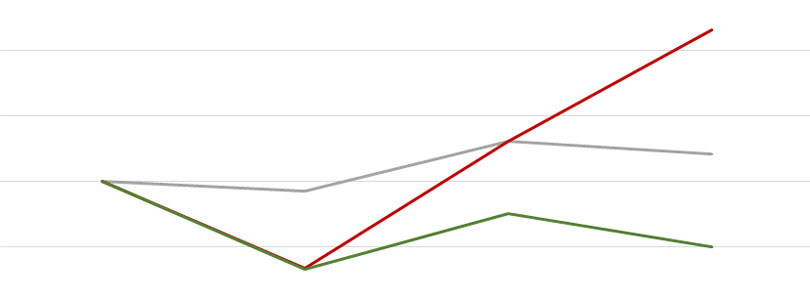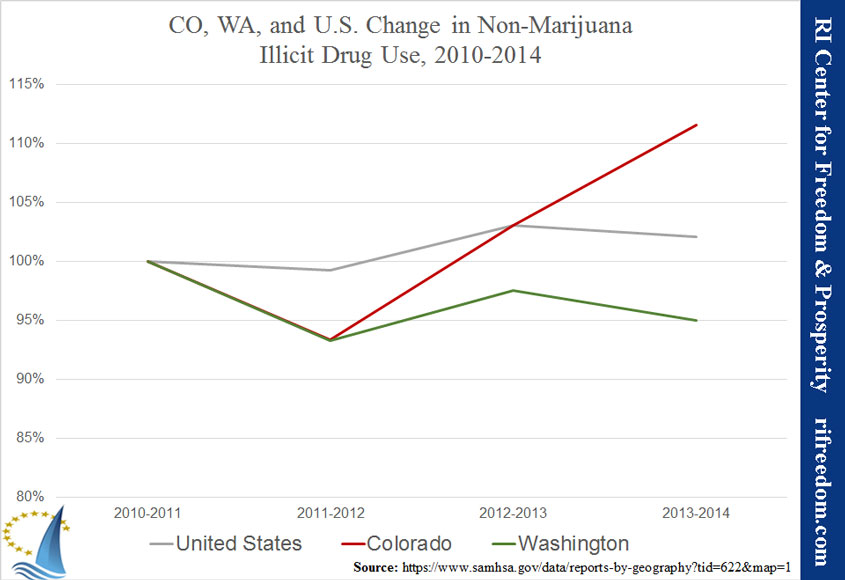Postscript on the Potentially Deadly Effects of Pot Legalization
After my post on marijuana legalization, yesterday, I spent some time in a multi-part Twitter conversation with Luis Vargas, of Providence, who made some thoughtful points (limited, naturally, by the medium) on the other side. Without going into all of the details, just now, I should make one point very clear: The argument of my post wasn’t that using pot makes people use harder drugs, with a certain percentage of them dying of drug overdoses, and therefore Rhode Island should never legalize marijuana.
Rather, the argument was that some startling evidence of increases in illegal drug usage (which is logically associated with increases in drug deaths) in Colorado should give us pause — leading us not to be “too breezy,” as the title of the post put it. That is, we should wait for more evidence from other states that have already moved on the issue and, in the meantime, work on building a healthier family and community life in Rhode Island. Even beyond arguments that marijuana is a “gateway drug” that draws people toward the harder stuff, there may be factors we’re not considering. Maybe, for example, legalizing marijuana drives the black-market dealers to redouble their efforts to sell other drugs to keep their businesses going.
There is no urgency to change policy to make a drug that is currently illegal for non-medical reasons available for recreational use. If other states’ experience proves positive, the change will be inevitable. The only window that might close is the political window if those other states experience detrimental results, and that’s no reason to rush.
Let me illustrate the wisdom of waiting with a chart. This is the percentage change in the use of illegal drugs other than marijuana in Colorado and Washington, compared with the U.S. average and using the 2010-2011 round of data as a baseline.
Both Washington and Colorado legalized recreational marijuana in late 2012, but Colorado’s law enabled people to move more quickly. Notably, the moment the law was certified in Colorado, marijuana enthusiasts could begin growing their own plants and giving the drug to others, provided it wasn’t a sale transaction.
Washington did not allow this, and it took time for the state to develop regulations for retailers. Consequently, even by the end of 2014, only 3,774 pounds of marijuana had been sold in the calendar year in Washington and 22,653 for the full fiscal year ending midway through 2015. This contrasts with 109,578 pounds in full-year 2014 in Colorado, or 38,660 if we only count recreational pot.
In other words, one could reasonably suggest that my chart above shows the effects of legalized pot in Colorado, but not in Washington. When the new round of data is released for 2014-2015, we’ll have a much deeper picture. If Colorado’s 20% increase since the change of the law continues to climb, and if Washington joins Colorado in standing out from the national average with a big increase, then the correlation will begin to be more than an interesting observation. In the coming years, we’ll also start to see data from other states that took the pot plunge this year, including our neighbor, Massachusetts.
If results are generally positive, opposition will evaporate. If the data differs from state to state, and Rhode Islanders decide to move forward with legalization, we’ll be able to look at what they’ve done differently.
Whatever the reason, as long as it’s plausible that Colorado’s law did, in fact, spur increases in the use of worse, deadlier drugs than doobie, caution is in order.



